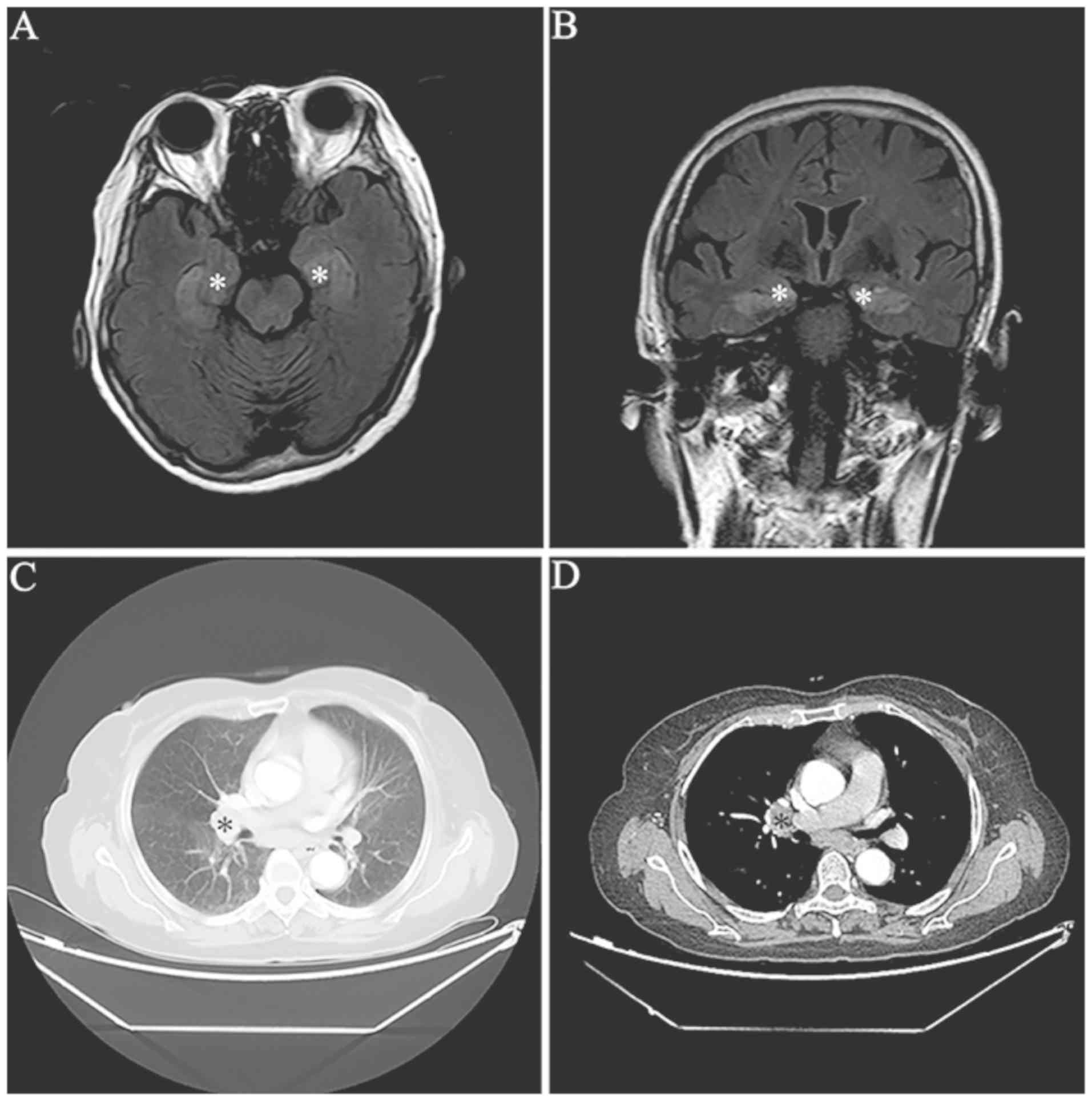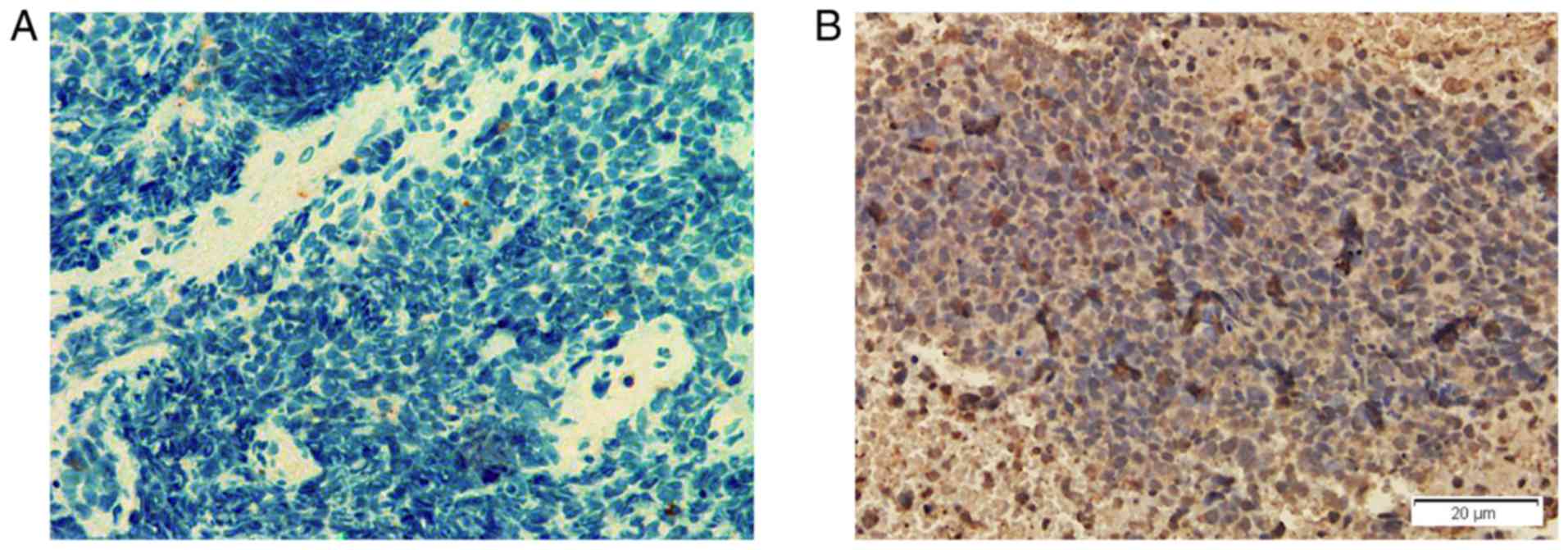|
1
|
Lancaster E and Dalmau J: Neuronal
autoantigens--pathogenesis, associated disorders and antibody
testing. Nat Rev Neurol. 8:380–390. 2012.PubMed/NCBI View Article : Google Scholar
|
|
2
|
Melzer N, Meuth SG and Wiendl H:
Paraneoplastic and nonparaneoplastic autoimmunity to neurons in the
central nervous system. J Neurol. 260:1215–1233. 2013.PubMed/NCBI View Article : Google Scholar
|
|
3
|
Dalmau J, Geis C and Graus F:
Autoantibodies to synaptic receptors and neuronal cell surface
proteins in autoimmune diseases of the central nervous system.
Physiol Rev. 97:839–887. 2017.PubMed/NCBI View Article : Google Scholar
|
|
4
|
Lancaster E, Lai M, Peng X, Hughes E,
Constantinescu R, Raizer J, Friedman D, Skeen MB, Grisold W, Kimura
A, et al: Antibodies to the GABA(B) receptor in limbic encephalitis
with seizures: Case series and characterisation of the antigen.
Lancet Neurol. 9:67–76. 2010.PubMed/NCBI View Article : Google Scholar
|
|
5
|
Höftberger R, Titulaer MJ, Sabater L, Dome
B, Rózsás A, Hegedus B, Hoda MA, Laszlo V, Ankersmit HJ, Harms L,
et al: Encephalitis and GABAB receptor antibodies: Novel findings
in a new case series of 20 patients. Neurology. 81:1500–1506.
2013.PubMed/NCBI View Article : Google Scholar
|
|
6
|
Dogan Onugoren M, Deuretzbacher D, Haensch
CA, Hagedorn HJ, Halve S, Isenmann S, Kramme C, Lohner H, Melzer N,
Monotti R, et al: Limbic encephalitis due to GABAB and AMPA
receptor antibodies: A case series. J Neurol Neurosurg Psychiatry.
86:965–972. 2015.PubMed/NCBI View Article : Google Scholar
|
|
7
|
Kim TJ, Lee ST, Shin JW, Moon J, Lim JA,
Byun JI, Shin YW, Lee KJ, Jung KH, Kim YS, et al: Clinical
manifestations and outcomes of the treatment of patients with GABAB
encephalitis. J Neuroimmunol. 270:45–50. 2014.PubMed/NCBI View Article : Google Scholar
|
|
8
|
Guan HZ, Ren HT, Yang XZ, Lu Q, Peng B,
Zhu YC, Shao XQ, Hu YQ, Zhou D and Cui LY: Limbic encephalitis
associated with Anti-γ-aminobutyric Acid B receptor antibodies: A
case series from china. Chin Med J (Engl). 128:3023–3028.
2015.PubMed/NCBI View Article : Google Scholar
|
|
9
|
Qiao S, Zhang YX, Zhang BJ, Lu RY, Lai QL,
Chen LH and Wu J: Clinical, imaging, and follow-up observations of
patients with anti-GABAB receptor encephalitis. Int J
Neurosci. 127:379–385. 2017.PubMed/NCBI View Article : Google Scholar
|
|
10
|
Zuliani L, Graus F, Giometto B, Bien C and
Vincent A: Central nervous system neuronal surface antibody
associated syndromes: Review and guidelines for recognition. J
Neurol Neurosurg Psychiatry. 83:638–645. 2012.PubMed/NCBI View Article : Google Scholar
|
|
11
|
Graus F, Titulaer MJ, Balu R, Benseler S,
Bien CG, Cellucci T, Cortese I, Dale RC, Gelfand JM, Geschwind M,
et al: A clinical approach to diagnosis of autoimmune encephalitis.
Lancet Neurol. 15:391–404. 2016.PubMed/NCBI View Article : Google Scholar
|
|
12
|
van Swieten JC, Koudstaal PJ, Visser MC,
Schouten HJ and van Gijn J: Interobserver agreement for the
assessment of handicap in stroke patients. Stroke. 19:604–607.
1988.PubMed/NCBI View Article : Google Scholar
|
|
13
|
Hainsworth JB, Shishido A, Theeler BJ,
Carroll CG and Fasano RE: Treatment responsive GABA(B)-receptor
limbic encephalitis presenting as new-onset super refractory status
epilepticus (NORSE) in a deployed U.S. soldier. Epileptic Disord.
16:486–493. 2014.PubMed/NCBI View Article : Google Scholar
|
|
14
|
Emson PC: GABA(B) receptors: Structure and
function. Prog Brain Res. 160:43–57. 2007.PubMed/NCBI View Article : Google Scholar
|
|
15
|
Prosser HM, Gill CH, Hirst WD, Grau E,
Robbins M, Calver A, Soffin EM, Farmer CE, Lanneau C, Gray J, et
al: Epileptogenesis and enhanced prepulse inhibition in
GABA(B1)-deficient mice. Mol Cell Neurosci. 17:1059–1070.
2001.PubMed/NCBI View Article : Google Scholar
|
|
16
|
Boronat A, Sabater L, Saiz A, Dalmau J and
Graus F: GABA(B) receptor antibodies in limbic encephalitis and
anti-GAD associated neurologic disorders. Neurology. 76:795–800.
2011.PubMed/NCBI View Article : Google Scholar
|
|
17
|
Jia XT, Pan Y, Di Z, Gu N, Liu Z and Kang
YM: Anti-GABAB receptor encephalitis in a patient with gastric
adenocarcinoma. Neurol Sci. 39:1981–1984. 2018.PubMed/NCBI View Article : Google Scholar
|
|
18
|
Mizuta K, Osawa Y, Mizuta F, Xu D and
Emala CW: Functional expression of GABAB receptors in airway
epithelium. Am J Respir Cell Mol Biol. 39:1981–1984. 2018.
|
|
19
|
DeLuca I, Blachère NE, Santomasso B and
Darnell RB: Tolerance to the neuron-specific paraneoplastic HuD
antigen. PLoS One. 4(e5739)2009.PubMed/NCBI View Article : Google Scholar
|
|
20
|
Titulaer MJ, Soffietti R, Dalmau J, Gilhus
NE, Giometto B, Graus F, Grisold W, Honnorat J, Sillevis Smitt PA,
Tanasescu R, et al: Screening for tumours in paraneoplastic
syndromes: Report of an EFNS task force. Eur J Neurol. 18:e19–e3.
2011.PubMed/NCBI View Article : Google Scholar
|
|
21
|
Dubey D, Samudra N, Gupta P, Agostini M,
Ding K, Van Ness PC, Vernino S and Hays R: Retrospective case
series of the clinical features, management and outcomes of
patients with autoimmune epilepsy. Seizure. 29:143–147.
2015.PubMed/NCBI View Article : Google Scholar
|
















